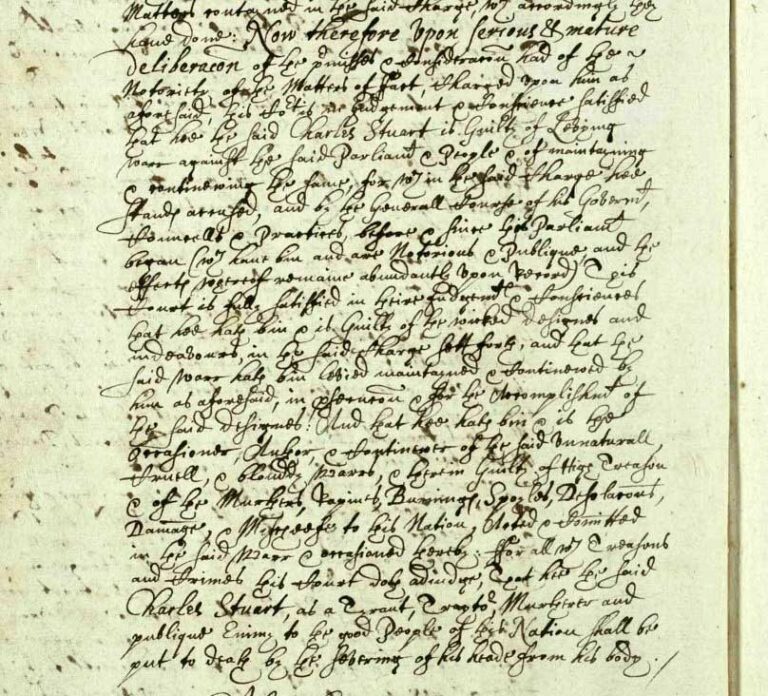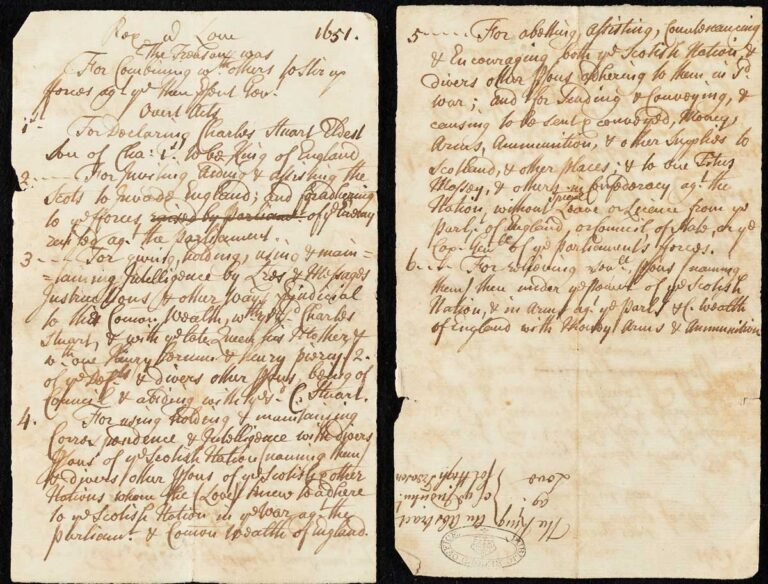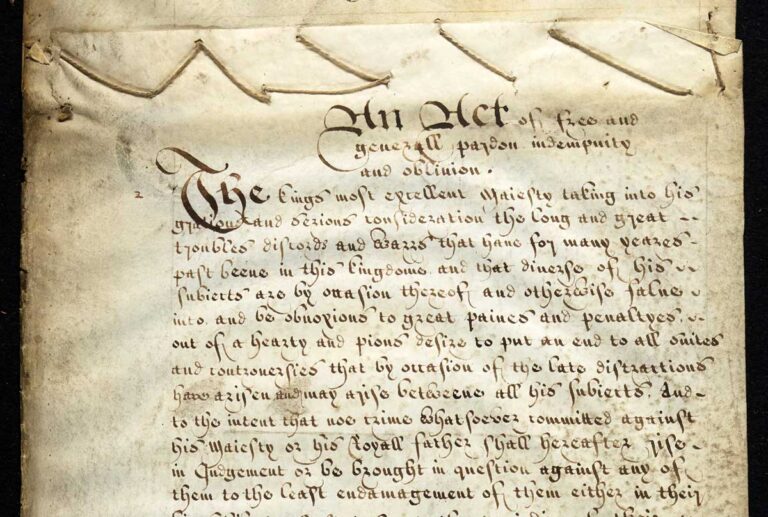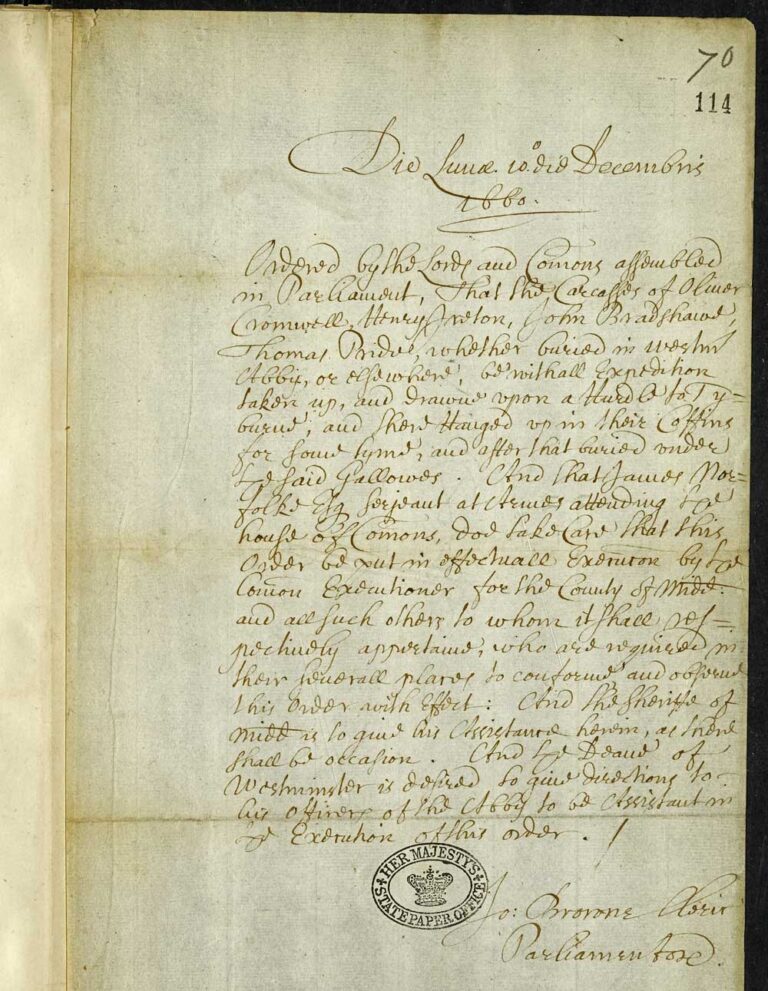Treason doth never prosper; what’s the reason?
For if it prosper, none dare call it Treason.
John Harington
Levying war against the Crown was one of the key treasonable offences defined by the 1352 Treason Act. Yet, during the civil wars of the 1640s and again in the American Revolutionary War of the 1770s and 80s, those that levied war against the monarch not only avoided punishments for treason, but rejected royal authority and accused their kings of levying war – of committing treason – against the state.
On 30 January 1649, this resulted in the execution of King Charles I for ‘levying war against the said Parliament and People’ (see footnote 1); on 4 July 1776, the thirteen United States of America declared themselves independent from King George III, who had established ‘an absolute Tyranny over these States’ (see footnote 2). Thereafter, treason laws protected these republican states, not the monarch.
In this, the first of two blogs, we’ll examine how Charles I’s executioners used the language of treason to prosecute the king, and how treason laws were subsequently used during the Commonwealth period (1649-1660).
Against the kingdom
In the medieval period, monarchs would often use Parliament to denounce their predecessors, alleging that they had committed treasonous acts. One of Henry VII’s first moves, following his victory over Richard III at the battle of Bosworth in 1485, was to pass an act of attainder through Parliament declaring that Richard and his supporters had ‘traitorously levied war’ against the new – legitimate – king, Henry VII.

However, the trial of Charles I in January 1649 was the first time that Parliament – specifically the Commons – had acted against a reigning monarch without the backing of a rival claimant to the throne. The Parliamentary army had emerged victorious over Charles’ Royalist forces during the civil wars of the 1640s, in which several thousand civilians were estimated to have died. As the head of the defeated party, the king was therefore blamed for such bloodshed, and the Commons moved to punish Charles for these crimes.
They were acting without precedent, and so the Commons continually stressed that they had the authority to try traitors, and that even the king could commit treason, not against himself but against the kingdom. On 1 January 1649, the Commons declared that ‘by the fundamental Laws of the Kingdom, it is treason in the King of England, for the Time being, to levy War against the Parliament and Kingdom of England’ (see footnote 3).
Three days later, they reinforced this authority, declaring that ‘the Commons of England, in Parliament assembled, being chosen by, and representing the People, have the Supreme Power in this Nation’ (see footnote 4). On this authority, they established the High Court of Justice, specifically for the purpose of trying the king. Throughout his trial, however, Charles I refused to acknowledge the authority of this High Court of Justice to try him.
On the afternoon of 23 January, therefore, chief prosecutor John Cook warned the king that if he continued to refuse to answer the charges laid against him, then the court would proceed to sentencing. Charles remained resolute, and was sentenced on 27 January 1649. For raising the standard against and causing the bloodshed of his subjects during the civil wars of the 1640s, Charles was found ‘guilty of High Treason and of the murders, rapines, burnings, spoils, defilations, damages, and mischiefs to this nation’.
Three days later, on 30 January, Charles I was executed outside of Banqueting House at Westminster, ‘put to death by the severing of his head from his body’ (see footnote 5). Treason was now definitively a crime against the state.

Indemnity and oblivion
Despite executing their king, undoubtedly an act of treason, those responsible for this historic act were not initially tried as traitors. They had successfully argued that Charles was the traitor, and made moves to further legitimise their right to rule by enacting new treason legislation that protected them. This new legislation reinforced that it was treason to levy war against the state or to adhere to its enemies. It also made it a treasonable act to declare that Charles Stuart, the eldest son of Charles I (and the future Charles II), was the rightful king of England.

But, treason laws only protected those responsible for the execution of Charles I so long as they remained in power. In 1660, with the return of the monarchy under Charles II, they had good reason to fear that the new king would punish them for the treasonous acts they committed against his father, Charles I.
In the 1660 Indemnity and Oblivion Act, Charles II pardoned most people that had committed crimes during the civil wars and the Commonwealth period. However, those men involved in the killing of Charles I were not included in this pardon, and instead were to be hunted down and tried for treason.

Even death could not save these regicides. The bodies of four men who had already perished – Oliver Cromwell, John Bradshaw, Henry Ireton, and Thomas Pride – were exhumed so that they could be ritually executed for treason. Their corpses were hanged in chains at Tyburn, then their heads were removed and placed on spikes above Westminster Hall. Finally, their bodies were thrown into a common grave beneath the gallows.

A precedent set
Treason laws, then, only protected you for as long as you held authority within the realm. Though the regicides of Charles I ultimately fell afoul of these laws, they had set an important precedent that monarchs could be held accountable for crimes against their people.
A century later, during the American Revolutionary Wars, an English – now British – monarch would once again be accused of committing treasonous acts against their subjects. The alleged crimes of George III against his American subjects will be the topic of the final part of this two-blog series.
Footnotes
- The sentencing of Charles I, SP 16/517, fo 44v
- The US Declaration of Independence, EXT 9/1
- Journal of the House of Commons: Volume 6, 1648-1651 (London, 1802), p 107
- Ibid, p 111
- SP 16/517, fo 44v
The article states “Despite executing their king, ‘undoubtedly’ an act of treason”. But after a period of peace, Charles resumed ‘war against the said Parliament and People’ for which after a trial he was consequently found guilty. Thus his punishment cannot be ‘undoubtedly’ treason – unless one considers Parliament must be subserviant to a King (the essence of the situation).
Suppose during a war which was against the monarch’s interest, a King fed critical information to the enemy, would you not admit this to be treason ?
Very interesting and informative.
Catherine Palmer, Sydney, Australia.
Very interesting and intriguing. I love this piece of history. Thumbs uo. Nonetheless, the narrative state that after the execution of Charles I, other laws were passed that prevented his eldest son from becoming King, Charles II, yet the narration again brings him as king, Charles II. Finally, what’s the relationship between Charles I and the current king of England, Charles III?
This shifting rule of Treason is exactly the reason that Treason is narrowly defined in the United States Constitution in Article I.
Thanks, we find this and the other historical items so interesting.
If Laws were passed to prevent King Charles II to be King as per his Father Charles I, why make Laws and then break them?
I am an ancestor to Oliver Cromwell and can see this as an opportunity to a disputed claim against the Monarchy. Oliver Cromwell’s son Richard Cromwell should not of been intimidated by any Parliament especially the one that was dissolved by Oliver Cromwell.
I may write a complaint for this issue.
It was “undoubtedly treason” because the relevant legislation (Treason Act 1351) remained in force throughout the process (otherwise Cromwell’s side could not have used it) and thus unarguably usable by a succeeding prosecuting authority. Imaginative interpretation by one regime does not legitimise the action if a later regime sticks to their interpretation which actually matches the Act – “Compassing the death of the King..”, “levying War; adhering to the King’s Enemies”.
Sir do u imply that oliver Cromwell is rightful king? He fought against the king acting as a tyrant against a previously agreed on body of democratic checks on kingly oversight. That’s what the matter was, and a king trapped in the concept of appointed by god…… that can go to one’s head. But he was the absolute king from the blood. His predecessor set the president of destination of power (which I believe correct). If u fight the king for a war against the legislators, sovereign comander and absolute ruler promised birthright, can’t u see the conflict of interest? No king should spread rapine on the populace. But, where did Oliver Cromwell gain the head of common wealth aside from revolution?? Revolution itself can be positively progressive, or not more often, either way, he passed a decapitation sentence on the sovereign. The king would’ve probably done the same. And the king was overreaching extremely. It was treasonous and unwise to mistreat a sovereign that way, unless the annihilation of the line followed. So, a son has right to vendetta. Cromwell then actually became a manifest traitor. We’re not bound by universal truth, only the truth the the moment, generation, further lasting culture, and dreadful law. If one illusion is broken, what come after needs a stronger one or the previous one is the better. Tradition over chaos
I’m curious about the challenges to Richard II in the 1380s and 1390s. He was not, as far as I know, charged with treason, but he was charged with a whole list of malfeasant actions and with undermining the commonwealth, including perhaps pursuing military support from France against his internal challengers. He was eventually deposed, or persuaded to relinquish his sovereignty, in part for ordering the murder of his uncle, one of those who had challenged his policies and absolutist mode of governing. These were crimes against the commonweal and commonwealth that brought him down. IS that a precedent to what occurred with Charles I?